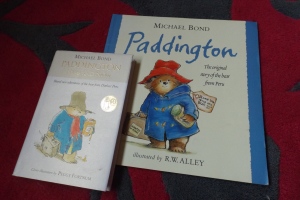Five great book adaptations for the screen
Having spent New Year’s Eve at the cinema with my children watching the new Paddington film and thoroughly enjoying it, it got me thinking about the books which have translated best into films and TV. The subject of adaptations is always a thorny issue. My Mum is very unsure about the future television programmes, now in production, based on Diana Gabaldon’s Outlander series. When books are very close to a reader’s heart, trying to transfer that magic onto the screen can prove disastrous and be bitterly disappointing for loyal fans. But on the whole, taking a bestseller and making a movie out of it should pretty much be a banker for the big studios, which is why we get so many of them.
For what it’s worth, these are my top five choices:
1. The Box Of Delights by John Masefield was made into a BBC Two drama in 1984 and was shown on consecutive Christmases over the following years. This series is a magical memory from my childhood. I used to read the book at the same time as watching the programme, for maximum enjoyment! Although the special effects are dated now, the acting and script were terrific and very closely followed Masefield’s wonderful tale. But it was the haunting musical score, adapted from the Christmas carol, ‘The first Noel’, that made this series so special to me. The thought of it still sends a little shiver down my spine…
2. The Lord of the Rings Trilogy by Tolkien.
I’m not a great fantasy fan but JRR Tolkien’s books have got to be the exception. He created a whole new world within his series of books. Many had tried and failed to bring that world to the big screen before director Peter Jackson took up the challenge at the start of the 21st Century. The books were written for the most part during World War Two and published in the 1950s. Since that time, they have become amongst the best-selling novels ever written. But Jackson did the books justice. The viewer can immerse themselves as fully in these films as they could in the pages of Tolkein’s books; a truly incredible accolade. There are some real highlights in these films, even for those who don’t necessarily enjoy the action and magic. The relationship between the Hobbits; particularly the friendship between Frodo and Sam, for example, is superbly rendered by the actors and script.
3. Rebecca by Daphne Du Maurier.
I had certainly enjoyed reading Du Maurier’s 1938 novel about a young wife having to live in the shadow of her predecessor and discovering that she must have confidence in herself if she wants her marriage to survive. However, this is one of those rare occasions when I think the film was better than the book. Directed by Alfred Hitchcock and starring Joan Fontaine and Laurence Olivier, I first saw this 1940 film at a screening when I was at university. It seemed to capture the atmosphere of the novel perfectly and is remembered best perhaps for Judith Anderson’s portrayal of the wicked Mrs Danvers. For me, the great performance is from Fontaine, who manages to flesh out the protagonist’s character very well, despite having to take on the challenge of being the leading lady with no name. Fontaine gives her more gumption than she ever had in the novel, which is what transports the film onto a higher level. This is a story which can only ever be re-imagined effectively in black and white!
4. North and South by Elizabeth Gaskell.
This was a novel that I studied at university and greatly enjoyed. Ultimately, it is a romance between Margaret Hale and mill owner John Thornton after their two worlds collide when Margaret is forced to move from the countryside to the industrial town of Milton in the north west. Gaskell’s novel was published in 1855 and was designed to highlight the important social issues of the day. However, the book is never didactic, which it easily could have been, and the tensions and drama created by a strike at Thornton’s mill prove to be perfect literary devices for Gaskell to make her book both gripping and thought provoking.
In 2004, the BBC adapted the book into a Sunday evening mini-series which proved to be equally as good as the novel. In fact, I used the segments depicting the factory workers to show my classes when I was teaching about the Industrial Revolution. But more than this, it was the superb love story between Hale and Thornton which was beautifully played by Daniela Denby-Ashe and Richard Armitage which made this series really excellent.
5. The Diary of a Wimpy Kid series by Jeff Kinney.
I am not particularly a fan of kid’s movies and it’s my husband who usually takes our children to the cinema. However, we have a junior club at our local picture house which shows movies for a pound on a Saturday morning. On one particular day, the film we wanted to see was sold out, so I opted for the alternative instead. It turned out to be The Diary of a Wimpy Kid: Rodrick Rules, the second of Kinney’s franchise. To my astonishment, I really enjoyed it and found myself both amused and moved by the film. As with all great adaptations, it’s actually pretty tricky to put your finger on what makes it work, but the humour is very well played in these films and you begin to care about the main characters and what happens to them; even Rodrick. After seeing this movie, my daughter wanted to read the books and now is an avid fan, waiting eagerly for each new episode to be released.
This is my top five (at this moment in time) but I’ve no doubt others will disagree. If I’ve left out something obvious, feel free to let me know.




